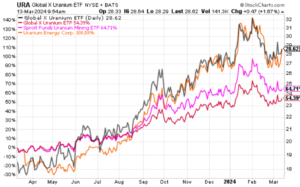The Global X Uranium ETF (URA) is up more than 54% since March 2023. The Sprott Uranium Miners ETF (URNM) is up nearly 65%. And U.S.-based uranium miner Uranium Energy (UEC) has popped almost 110%.

In other words, the bull market in uranium stocks has not wavered – and it won’t anytime soon.
That’s because uranium is the core ingredient in nuclear reactors. And nuclear energy is undergoing a renaissance right now.
Of course, nuclear energy has had its setbacks over the past 50 years. But it has become increasingly clear that it is the €˜Pareto-optimal’ solution to the world’s energy crisis.
Obviously, the world needs more energy. But fossil fuels aren’t cutting it amid the global shift toward clean energy. And renewables like solar and wind are exceptionally expensive and unreliable, especially now, when the world is trying to avoid higher costs and power outages.
But nuclear energy solves all those shortcomings.
Unlike fossil fuels, nuclear reactors do not produce any direct carbon dioxide emissions or air pollution. And unlike renewables, nuclear energy is abundant and cheap. Plus, it can be produced at all times of day and in all weather conditions.
Nuclear power is everything you’d want in an energy source.
Nuclear Energy: The Ultimate Power Source?
For a long time, folks were fearful of nuclear reactors’ potential threats to safety. Considering the disasters of Chernobyl and Fukushima, that’s entirely understandable. But those concerns have proven antiquated in recent years. In fact, these days, you’d be hard-pressed to find any serious scientist questioning the safety of nuclear energy.
Specifically, engineering and efficiency improvements to nuclear reactors have all but made safety concerns obsolete. Reactors have become increasingly good at containing radioactive waste. And now nuclear energy is basically the safest form of energy production in the world.
For example, for every terawatt-hour of coal electricity produced, about 26 people die from accidents and air pollution. For oil, that figure stands at 18 deaths per terawatt-hour of electricity produced.
But for nuclear power plants, just 0.03 people die from related accidents and air pollution.
These days, nuclear energy is super-clean, super-cheap, super-abundant, super-reliable – and super-safe.
What’s not to like about nuclear nowadays?
Not much – which is why governments across the world are starting to take notice. They are ditching antiquated beliefs about nuclear reactors and embracing them instead, centering nuclear power in their future energy plans.
Right now, the U.S. is spearheading a multinational effort to triple nuclear energy capacity by 2050. The United Kingdom announced its biggest expansion plans for nuclear power in 70 years, vowing to quadruple production. France recently introduced a new energy bill that prioritizes additional nuclear energy development. And Canada is building the world’s largest nuclear power plant in Ontario.
Clearly, the Nuclear Renaissance has arrived.
It’s time to invest – and profit big-time from this renaissance.
But how?
That’s where we come into play.
The Final Word
For the past several months, we’ve been studying the nuclear energy industry. And we’ve identified two very promising investment opportunities therein: domestic uranium miners and nuclear fusion developers.
In short, most of the world’s uranium supply comes from Kazakhstan, Russia’s neighbor. And as Western nations increasingly develop nuclear reactors, they will also increasingly want to power those reactors with domestically sourced uranium – not uranium from Kazakhstan. Therefore, it seems that domestic uranium miners would make great investments.
Additionally, we believe that recent rapid developments in AI will allow us to soon solve the world’s nuclear fusion problem, allowing us to create sustainable, safe, and powerful nuclear fusion reactors. And that will be an absolute game-changer for folks around the globe.
That’s why, considering the Nuclear Energy Renaissance’s current trajectory, we’re looking for domestic uranium miners and nuclear fusion developers.
And in fact, we recently bought a few of our top picks in this space.
Find out their names and ticker symbols.
On the date of publication, Luke Lango did not have (either directly or indirectly) any positions in the securities mentioned in this article.
P.S. You can stay up to speed with Luke’s latest market analysis by reading our Daily Notes! Check out the latest issue on your Innovation Investor or Early Stage Investor subscriber site.
